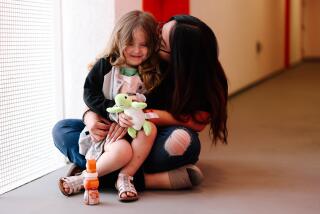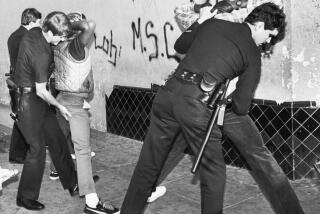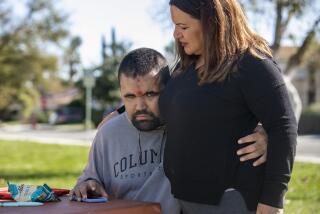Group home offers troubled youths skills, confidence to succeed
Some kids don’t want to look back when they turn 19 and find themselves released — “emancipated” — from foster homes they were placed in because of family problems or brushes with the law.
But not Arturo Flores.
Flores was so grateful for his 2005 and 2006 stay at a Highland Park group home operated by Optimist Youth Homes and Family Services that he returned to become a counselor.
“I wasn’t planning to work here. I just wanted to give back for what this place did for me,” said Flores, now 24. “This place did a lot.”
Flores said he was 16 when his life spiraled out of control.
“I was being bullied at Fremont High School. One day I got jumped in a school bathroom. That afternoon I was picking up my sister at her softball practice when I saw one of the people who had jumped me,” he said.
Grabbing a softball bat, Flores chased the bully, swinging it wildly. Unfortunately, the bat struck another boy by mistake, causing a head wound that took five stitches to close. The incident resulted in a charge of assault with a deadly weapon.
A few weeks later, Flores ran away from home after a fight with his father and ended up moving in with an older sister. He dutifully reported his living arrangement to his newly appointed probation officer.
“I told my probation officer I’d rather go to juvenile hall than back home. I could tell by her expression that she was shocked by that,” he said. “She put me in juvenile hall and I stayed there a month until I came here.”
Flores said his time at the five-acre hillside Optimist campus on North Figueroa Street was life-changing.
“This place was a step up. For the first time I had a bed — at home I’d slept on the floor. I got clothes, shoes, my first toothbrush,” he said. “I’d never gone to the dentist. I found out that I had eight cavities.”
Flores graduated from Highland Park’s Franklin High School about the same time he was emancipated from the Optimist program. After that, he briefly enrolled at Cal State Northridge before signing up for the Marine Corps.
“I decided I needed direction in my life. My recruiter was a straight shooter: He told me what I could expect and where I would be sent,” he said.
During his five-year tour of duty he was deployed to both Iraq and Afghanistan. He worked as a military policeman and as the handler of a dog trained to sniff out roadside bombs.
In Afghanistan, each Marine was given the opportunity to fly the U.S. flag for a day to honor someone or some group. One day in June 2011, Flores flew the flag in honor of Optimist Youth Homes.
When he left active duty, Flores enrolled as a business management student at Los Angeles Southwest College near Inglewood. Then he made a beeline back to Highland Park.
“In January, Arturo came here and said he wanted to make a presentation to our board. He’d paid to have the flag he’d flown framed and he wanted to give it to us,” said Silvio Orlando, executive director of Optimist Youth Homes.
Flores wore his Marine Corps dress blues for the presentation. Afterward, he asked Orlando about job opportunities at the group home.
“I told him that occasionally we hire graduates but that he would have to apply through regular channels because I don’t micro-manage things here. Arturo said he’d want to work in the same unit he graduated from, the Independent Learning Program,” Orlando said.
That program focuses on teaching older youths life skills such as cooking, balancing checkbooks, the importance of savings and work tips — how to dress appropriately, write a resume and interview for jobs.
The Optimist program provides six months of follow-up service for those who reach emancipation and leave the group home.
The organization’s 97-bed center and its services are primarily funded by contracts with county and state agencies, although contributions are made by 80 Southern California Optimist Clubs in a relationship that dates to 1917. Its annual budget is $23 million.
Those living in the 12-bed Independent Living unit pay attention when Flores discusses the challenges — and opportunities — that await them after emancipation.
“He’s been through what we’ve been through,” said 17-year-old Issak Okita, who took up residency at Optimist because of teenage vandalism and drug possession in Hemet. His goal is to become a financial planner.
“He’s been in our shoes. I look up to him a lot,” agreed Vincent Balderas, 18, of East Los Angeles. Balderas said he doesn’t like to talk about past transgressions, focusing instead on becoming a chef when he leaves the Optimist program in August.
Seventeen-year-old Stephen Lucas of Ontario said he came to the Optimist home after he threatened a bully with a knife a year and a half ago. He said Flores has counseled him to “use my time wisely and focus on my finances” so he is prepared when he leaves the program next month in hopes of becoming a music producer.
Housemate Ryan McIlhargie, 18, of San Jose said he landed in trouble for street fighting. He said Flores’ own youthfulness means he understands teen jargon used by the home’s residents. “Like ‘burn the spot,’” said McIlhargie, who is aiming for a career as a musician.
Balderas, Lucas, Okita and McIlhargie were quick to notice the puzzled look on a visitor’s face.
“It means ‘stepping on somebody’s toes,’” Okita translated. The others nodded in agreement.
More to Read
Start your day right
Sign up for Essential California for news, features and recommendations from the L.A. Times and beyond in your inbox six days a week.
You may occasionally receive promotional content from the Los Angeles Times.







